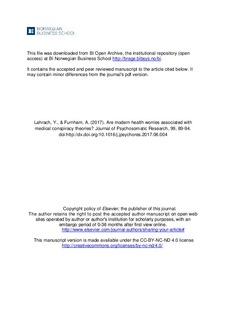| dc.contributor.author | Lahrach, Y. | |
| dc.contributor.author | Furnham, Adrian | |
| dc.date.accessioned | 2017-08-23T08:52:15Z | |
| dc.date.available | 2017-08-23T08:52:15Z | |
| dc.date.issued | 2017 | |
| dc.identifier.citation | Journal of Psychosomatic Research. 2007, 99, 89-94. | nb_NO |
| dc.identifier.issn | 0022-3999 | |
| dc.identifier.uri | http://hdl.handle.net/11250/2451562 | |
| dc.description.abstract | This study was concerned with whether Medical Conspiracy Theories (MCTs), along with other variables (demographics, ideology and health perceptions) are associated with Modern Health Worries (MHWs). MCTs were significantly associated with MHWs over and above all other variables. Older individuals, with more religious and right-wing beliefs had higher MHWs. In addition, those who used Complementary and Alternative Medicine (CAM) and individuals who perceived their mental health as worse than their peers were also more likely to display higher MHWs. Implications for helping health professions understand their patients' health-related beliefs and choices were discussed | nb_NO |
| dc.language.iso | eng | nb_NO |
| dc.publisher | Elsevier | nb_NO |
| dc.title | Are modern health worries associated with medical conspiracy theories? | nb_NO |
| dc.type | Journal article | nb_NO |
| dc.type | Peer reviewed | nb_NO |
| dc.description.version | acceptedVersion | nb_NO |
| dc.rights.holder | Copyright policy of Elsevier, the publisher of this journal. The author retains the right to post the accepted author manuscript on open web sites operated by author or author's institution for scholarly purposes, with an embargo period of 0-36 months after first view online. Http://www.elsevier.com/journal-authors/sharing-your-article# | nb_NO |
| dc.source.pagenumber | 89-94 | nb_NO |
| dc.source.volume | 99 | nb_NO |
| dc.source.journal | Journal of Psychosomatic Research | nb_NO |
| dc.identifier.doi | 10.1016/j.jpsychores.2017.06.004 | |
| dc.description.localcode | 1, forfatterversjon | nb_NO |
